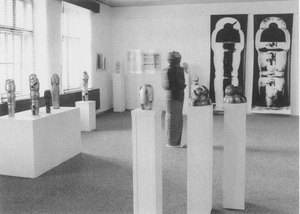Difference between revisions of "Juraj Bartusz"
| Line 1: | Line 1: | ||
Born 1933. Sculptor and conceptual artist. In 1972 he started to work with the computer, cooperating with the computer programer [[Vladimír Haltenberger]]. Computer generated curves were used as a template for manufacturing rotational, human-like sculptures. The initial drawings were chosen from random series created by a computer. In [[1998]] founded [[Visual Arts and Intermedia FU TU Košice]] where he heads the Studio of Free Creativity 3D. | Born 1933. Sculptor and conceptual artist. In 1972 he started to work with the computer, cooperating with the computer programer [[Vladimír Haltenberger]]. Computer generated curves were used as a template for manufacturing rotational, human-like sculptures. The initial drawings were chosen from random series created by a computer. In [[1998]] founded [[Visual Arts and Intermedia FU TU Košice]] where he heads the Studio of Free Creativity 3D. | ||
| − | |||
From the Profil interview: "Počítač vypočítal množstvo rôznych kriviek a pre ďalší postup som zvolil jednu z nich, náhodou, podľa čísla poradia, bez vizuálnej inšpekcie jej tvaru. Cieľom bolo eliminovať subjektívny výber krivky. Na základe počítačovej kresby sa vysústružilo rotačné teleso, ktoré som potom dotváral frézovaním, brúsením a leštením. Celý proces tvorby artefaktu pripomínal prácu konštruktéra a projekt bol urobený tak, aby podobné artefakty mohol podľa neho vytvoriť ktokoľvek." | From the Profil interview: "Počítač vypočítal množstvo rôznych kriviek a pre ďalší postup som zvolil jednu z nich, náhodou, podľa čísla poradia, bez vizuálnej inšpekcie jej tvaru. Cieľom bolo eliminovať subjektívny výber krivky. Na základe počítačovej kresby sa vysústružilo rotačné teleso, ktoré som potom dotváral frézovaním, brúsením a leštením. Celý proces tvorby artefaktu pripomínal prácu konštruktéra a projekt bol urobený tak, aby podobné artefakty mohol podľa neho vytvoriť ktokoľvek." | ||
| − | + | ==Articles== | |
| − | |||
Interview with Juraj Bartusz. Profil. 4/1993. pp. 4. | Interview with Juraj Bartusz. Profil. 4/1993. pp. 4. | ||
| + | ==Works== | ||
| + | [[Image:Bartusz-exhib-1973.png|thumb|left|Juraj Bartusz, retrospective exhibition in Košice, aluminum art objects from 1973-74. (Photo: Milan Bobula) The objects were made according to computer drawings utilizing boundary curves generated by the HP 9030A computer.]] | ||
| − | http://www.gjk.sk/bartusz.html | + | ==More== |
| − | + | * http://www.gjk.sk/bartusz.html | |
See also: [[Early computer art in Slovakia (1970s-80s)]], [[Performance art in Slovakia (1960s-2000s)]]. | See also: [[Early computer art in Slovakia (1970s-80s)]], [[Performance art in Slovakia (1960s-2000s)]]. | ||
Revision as of 12:48, 30 August 2008
Born 1933. Sculptor and conceptual artist. In 1972 he started to work with the computer, cooperating with the computer programer Vladimír Haltenberger. Computer generated curves were used as a template for manufacturing rotational, human-like sculptures. The initial drawings were chosen from random series created by a computer. In 1998 founded Visual Arts and Intermedia FU TU Košice where he heads the Studio of Free Creativity 3D.
From the Profil interview: "Počítač vypočítal množstvo rôznych kriviek a pre ďalší postup som zvolil jednu z nich, náhodou, podľa čísla poradia, bez vizuálnej inšpekcie jej tvaru. Cieľom bolo eliminovať subjektívny výber krivky. Na základe počítačovej kresby sa vysústružilo rotačné teleso, ktoré som potom dotváral frézovaním, brúsením a leštením. Celý proces tvorby artefaktu pripomínal prácu konštruktéra a projekt bol urobený tak, aby podobné artefakty mohol podľa neho vytvoriť ktokoľvek."
Articles
Interview with Juraj Bartusz. Profil. 4/1993. pp. 4.
Works
More
See also: Early computer art in Slovakia (1970s-80s), Performance art in Slovakia (1960s-2000s).
